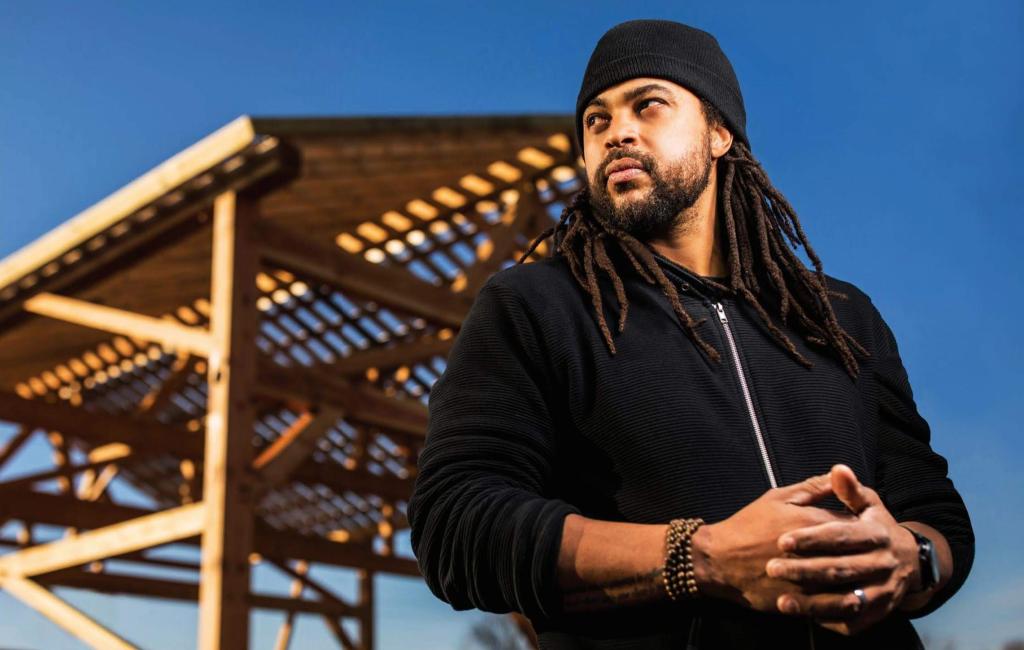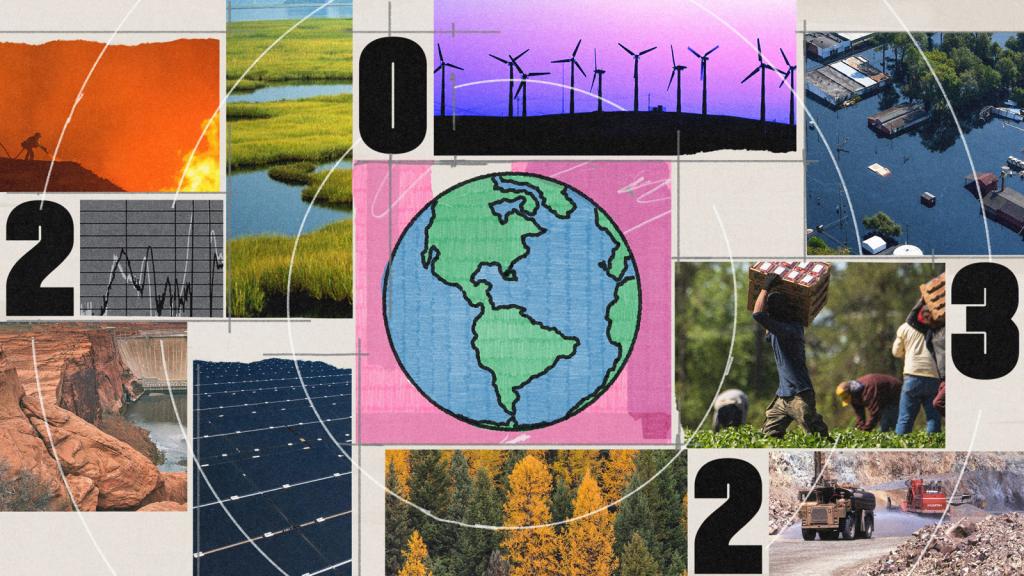These are trying times. Mass extinction, mass destruction, massive injustice — it can be flat-out depressing. One common prescription for climate woe is: Do something. Go to a march! Call your representative! Join the fight! But throwing your heart and soul into climate and justice work comes with its own set of tolls.
No one understands this better than the folks who are knee-deep in these issues every day. So I talked to three solutionaries about how they cope with the stress, and how they manage to shake the weight of the world off their shoulders … at least long enough to get out for a bike ride.
The experts: Olatunji Oboi Reed, founder of the racial justice nonprofit Equiticity, who was named to the Grist 50 in 2018; Kristen Poppleton, director of programs at the youth leadership organization Climate Generation; and Margaret Klein Salamon, a clinical psychologist turned climate mobilizer who directs the advocacy group The Climate Mobilization.
Their responses have been edited for length and clarity.
On what brought them to this work, and what brings them back day after day:
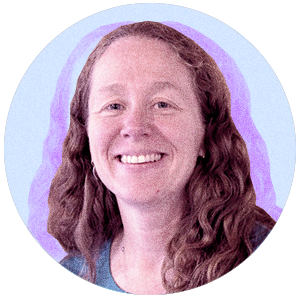
KRISTEN: So I started out as a naturalist. But at some point I just started feeling like, this isn’t enough. In the early 2000s, when the Union of Concerned Scientists put out their report on climate change in the Great Lakes — that was the first time I had seen something that put climate change in this format that was digestible for normal human beings, and also localized it. Like, this is my place. It wasn’t this super high-up-there global thing, it was a local issue. That hooked me.
Minnesota has the fastest-warming winters in the country. And because we’re a state that relies on winter — like, economically and tourist-wise, but also spiritually — you know, people from Minnesota, they’re like, “Oh, snow. Cold. That’s who we are.” We’re one of the leaders in the world on taking action on [climate change], and I wonder if it’s because of our experience here, because we see it in our faces every day.
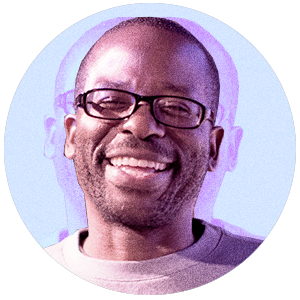
OBOI: Well, let me back up a little bit. I’m 45. I’ve struggled with depression since high school, so over 30 years. And for most of my life I was able to mask it. In my early career, I didn’t acknowledge that I had depression. Then I went to corporate America, where I couldn’t hide it — I couldn’t fight through it in a way that kept me safe at work.
So I would get severely depressed, have to take time off, get back to work, be alright, and then get depressed again. I took maybe two or three medical leaves of absence. And it was one of those times where I was severely depressed and isolated at home for quite some time — like, probably over a month — you know, refused to answer the phone, answer the door. It was in one of those dark moments where I realized I had a bike in the basement.
I wasn’t a cyclist — up until that point I probably rode like two times a year, only on the sidewalk around the neighborhood. But I thought to myself, maybe I’ll just go for a ride, just to get a little bit of respite from being in this dark room all day. So I mustered up the strength, took the bike to a shop — you know, got a flash fix or whatever — put it in the back of my truck and drove to the lakefront in Chicago, 63rd Street Beach. I took the bike out, took a deep breath and started riding.
Just a Saturday, summer morning, beautiful day out. The sun is in and out of the clouds, and it feels like it’s playing hide-and-go-seek with me. The waves crashing on the sand, on the beach — they felt like they were dancing with me. The wind blowing the leaves felt like a song in my ear. Nature spoke to me in a way that I had never experienced that morning, and it was beautiful and transformative. And that day, I became a cyclist.
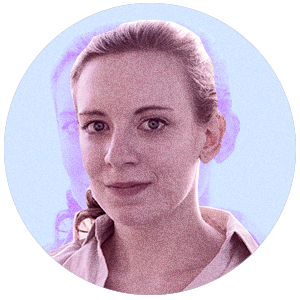
MARGARET: So, psychotherapy is kind of my family business. My parents met in clinical psychology graduate school. Virtually all of our family friends had at least one member who is a psychoanalyst. I mean it’s kind of like a religion. So, because of that, I became a patient of psychotherapy starting as a teenager. And it was extremely, extremely helpful to me.
I came to New York, to Adelphi University, where they have a very strong psychoanalytic program. And I thought, wow, I’m going to have a great career, great life. For a long time I was in a state of willful ignorance [about climate change] — which means I knew enough to know I didn’t want to know more. But living in New York City, especially through Hurricane Irene and Hurricane Sandy, I started to be really, really preoccupied with the climate emergency. And I started to do a little bit of writing and publishing online about some of the emotional elements of this.
The big turning point for me was when my good friend said to me, “Discourse isn’t enough. Think: What could you do to actually solve this problem?” And I had just never thought of it like that before. I thought of myself as an academic and a psychologist. But the idea of actually trying to solve this problem — literally my life has never been the same since that conversation. I just realized there’s nothing else that I want anywhere near as much as I want to do everything I can to try to, as we say at The Climate Mobilization, cancel the apocalypse.
On the parts of their work that feel energizing, even therapeutic:
 Any time I’m able to be on a bike — especially as a part of the work, [when] we do a community bike ride, or some partners want to explore a neighborhood via bicycle, or I’m on a bike going to meetings — any time I’m on a bike, it’s life-giving. Any time I’m on a bike and I’m on the lakefront, it’s heightened life-giving. When I’m around black and brown folks, it’s life-giving. When I’m in neighborhoods, organizing, engaging with partners at the neighborhood level, that’s life-giving.
Any time I’m able to be on a bike — especially as a part of the work, [when] we do a community bike ride, or some partners want to explore a neighborhood via bicycle, or I’m on a bike going to meetings — any time I’m on a bike, it’s life-giving. Any time I’m on a bike and I’m on the lakefront, it’s heightened life-giving. When I’m around black and brown folks, it’s life-giving. When I’m in neighborhoods, organizing, engaging with partners at the neighborhood level, that’s life-giving.
 There’s 13 [staff] here [at Climate Generation] now. And we’ve thought a lot about if we would hire someone remotely. I think one of the reasons that so far we have not hired remote, which I know is like the wave of the future, is that we really lean into each other. To laugh, to get outside and take moments to breathe — we have a very nurturing and supportive atmosphere here that is unique to the organization and to climate work in general.
There’s 13 [staff] here [at Climate Generation] now. And we’ve thought a lot about if we would hire someone remotely. I think one of the reasons that so far we have not hired remote, which I know is like the wave of the future, is that we really lean into each other. To laugh, to get outside and take moments to breathe — we have a very nurturing and supportive atmosphere here that is unique to the organization and to climate work in general.
 There’s this energy [in the climate movement], there’s this very clear sense of, like, being on a boat on a river and being taken somewhere. I think in some ways it really got started at Standing Rock. It’s a new movement, and it is distinct from the gradualist movements that came before it. It’s a movement that says, “This is not a problem. This is an emergency. We do not need incrementalism or tweaks to the system. We need total system transformation right now.” It’s really an amazing thing to be part of that. I sound like such a hippie …
There’s this energy [in the climate movement], there’s this very clear sense of, like, being on a boat on a river and being taken somewhere. I think in some ways it really got started at Standing Rock. It’s a new movement, and it is distinct from the gradualist movements that came before it. It’s a movement that says, “This is not a problem. This is an emergency. We do not need incrementalism or tweaks to the system. We need total system transformation right now.” It’s really an amazing thing to be part of that. I sound like such a hippie …
On the parts of their work that take a toll:
 I mean, I live in probably the most liberal neighborhood of one of the most liberal cities in the state of Minnesota, which is one of the most liberal states in the country. My friends are all on board with climate change being real. But it’s still like a weight you carry around that you feel like no one else really gets. It’s this burden. Even my husband, he’s like, “Oh, that’s your job to carry that burden,” you know? And when people say, “It’s so great you’re doing that,” I’m, like, “Uh, hi. Everyone needs to do something!”
I mean, I live in probably the most liberal neighborhood of one of the most liberal cities in the state of Minnesota, which is one of the most liberal states in the country. My friends are all on board with climate change being real. But it’s still like a weight you carry around that you feel like no one else really gets. It’s this burden. Even my husband, he’s like, “Oh, that’s your job to carry that burden,” you know? And when people say, “It’s so great you’re doing that,” I’m, like, “Uh, hi. Everyone needs to do something!”
 When I talk to people within The Climate Mobilization about their personal experience — staff, volunteers, supporters, organizers — the most common emotional experience that people talk about is alienation. Like, ‘No one understands the climate emergency. My friends don’t understand, my family doesn’t understand, my colleagues don’t understand’ — that kind of feeling. It’s a really defining experience for people who understand ecological reality. It’s a little bit like being in a nightmare: ‘Why is everyone acting normal? Why, when I walk down the street in Brooklyn, are there still all these people, like, idling their cars? Am I crazy or are they crazy?’
When I talk to people within The Climate Mobilization about their personal experience — staff, volunteers, supporters, organizers — the most common emotional experience that people talk about is alienation. Like, ‘No one understands the climate emergency. My friends don’t understand, my family doesn’t understand, my colleagues don’t understand’ — that kind of feeling. It’s a really defining experience for people who understand ecological reality. It’s a little bit like being in a nightmare: ‘Why is everyone acting normal? Why, when I walk down the street in Brooklyn, are there still all these people, like, idling their cars? Am I crazy or are they crazy?’
 What’s hurtful and harmful for me is the racism inherent in the work. Shortly after I started the bike club, the mayor [of Chicago] at the time, he was rolling out this huge strategy for bikes, right? Bike lanes, and Divvy — our bike-share system. And I was quoted in the New York Times, in essence saying, it’s great what the mayor is doing, however, should the historical pattern repeat itself, bicycle resources will be concentrated in predominantly white and middle- to upper-income neighborhoods, and we’ll see a trickle of those resources.
What’s hurtful and harmful for me is the racism inherent in the work. Shortly after I started the bike club, the mayor [of Chicago] at the time, he was rolling out this huge strategy for bikes, right? Bike lanes, and Divvy — our bike-share system. And I was quoted in the New York Times, in essence saying, it’s great what the mayor is doing, however, should the historical pattern repeat itself, bicycle resources will be concentrated in predominantly white and middle- to upper-income neighborhoods, and we’ll see a trickle of those resources.
And up until that point, I was sort of like the darling of the bike advocacy community because I was black, I was organizing black folks on the South Side to ride bikes. Everybody was like, “Yeah Oboi, go, go, go!” And then when I made that statement, a lot of them turned on me, told me that I was putting the mayor’s entire strategy at risk, that I have no evidence that what I’m concerned about is the way it’s going to be. It was intense backlash. There was enough pain associated with that that I didn’t know that I wanted to deal with this anymore.
On taking time for themselves when the work is so urgent:
 It’s tough for me. I do feel a sense of urgency, I love the work, I want to do it. I have a hard time saying no. So I have to be very deliberate — like I have to put it in my calendar, as a to-do note or a task in the agenda, you know. It’s not going to happen naturally for me.
It’s tough for me. I do feel a sense of urgency, I love the work, I want to do it. I have a hard time saying no. So I have to be very deliberate — like I have to put it in my calendar, as a to-do note or a task in the agenda, you know. It’s not going to happen naturally for me.
I love yoga, although I don’t do it enough. I love meditation — don’t do that enough either. When I first came back [after a recent hiatus], I knew how important it was to maintain those things that I love that have helped me stay healthy. I was pretty committed to it. And then as time got on, you know, just in terms of priorities, it started to go down on the list. I need to just recommit to those things.
 It definitely is a challenge, trying to balance the different areas of life. There are some different things that I do — one is kind of a simple one: I basically never set an alarm in the morning. So I just let my body decide when is the right time to wake up.
It definitely is a challenge, trying to balance the different areas of life. There are some different things that I do — one is kind of a simple one: I basically never set an alarm in the morning. So I just let my body decide when is the right time to wake up.
I also have a little bit of an unusual situation, which is really great for me. I live in a brownstone in Brooklyn with my family. My husband and I live on the third floor. My brother, sister-in-law, and nephew live on the first floor. And then my parents, when they’re in town, which is about a third or a fourth of the time, are on the second floor. That’s really nice for me, that set-up, because I can kind of dip in and out, go see my family just for an hour or something, you know, have dinner, and then go back to work.
 I’m probably better than a lot of people in this field for sure. I see people that just are always in it. And I know I can’t always be in it. We have a Slack channel at work that’s just news. Some days I will spend time reading a lot of the news and posting [stories], and reading what other people have posted. And then some days I know, I can just feel in my body, that I can’t do that. I will go into a panic.
I’m probably better than a lot of people in this field for sure. I see people that just are always in it. And I know I can’t always be in it. We have a Slack channel at work that’s just news. Some days I will spend time reading a lot of the news and posting [stories], and reading what other people have posted. And then some days I know, I can just feel in my body, that I can’t do that. I will go into a panic.
My husband directs a camp in northern Minnesota. So I work here in the city two days a week, and then I work remotely three days a week in the summer. And it’s literally off the grid. Like, when I go back to where we live, I have to go to the town that has the wifi for my work day. And I think it’s probably saving my life in some ways. Just the inability to check in on anything.
Advice for new-to-the-movement climate activists on avoiding burnout:
 Find a network to support you — people that are doing the work you’re doing, that aren’t necessarily even in your workplace. Find mentors and people.
Find a network to support you — people that are doing the work you’re doing, that aren’t necessarily even in your workplace. Find mentors and people.
You have to take time to have fun and go enjoy the world, and be creative. I look at Greta [Thunberg] and I look at Xiuhtezcatl [Martinez] and these young people — whenever I’ve seen pictures of Greta smiling, I’m like, oh, thank god. Because I just feel for her and what she’s doing for all of us.
 As urgent as it feels, recognize that it’s taken us decades, even centuries, to get to this place. There’s no quick fixes. It’s not going to take months, it’s going to take decades to fix the condition that we find ourselves in. And there’s no one person that’s going to save this planet. I don’t care who it is. Your idea will contribute — it’s one of so many on this planet that’s going to make a dent in this, in where we go from here. So pace yourself, you know, put things in context.
As urgent as it feels, recognize that it’s taken us decades, even centuries, to get to this place. There’s no quick fixes. It’s not going to take months, it’s going to take decades to fix the condition that we find ourselves in. And there’s no one person that’s going to save this planet. I don’t care who it is. Your idea will contribute — it’s one of so many on this planet that’s going to make a dent in this, in where we go from here. So pace yourself, you know, put things in context.
And be honest with the people around you — your board, your counselors or mentors, your staff, your family and friends. I know it’s tough to talk to some people about it. As open as I am publicly with this stuff, it’s tough for me to talk to my mom and my father about it, my brother. I’ll stand in front of a thousand people and tell them my whole story about depression instead of a room full of my friends.
 So, number one is, welcome all of your different emotions with self-compassion and curiosity and non-judgment. When I was a psychotherapist, I would talk about this with every single patient — because it’s just not how we normally handle our thoughts and feelings in this culture. We tend to be extremely judgmental.
So, number one is, welcome all of your different emotions with self-compassion and curiosity and non-judgment. When I was a psychotherapist, I would talk about this with every single patient — because it’s just not how we normally handle our thoughts and feelings in this culture. We tend to be extremely judgmental.
Fear is a major thing in the climate movement. And we have this idea that we can’t scare people, that fear doesn’t work as a motivator. Fear is one of the most basic motivators, not just for humans, but for all animals. Fear is literally how we translate our perception of risk into taking defensive action.
It’s the same with grief — there’s so much grief with the climate emergency. It is OK to grieve. It makes sense to grieve. We grieve because we love this world, and the people and species that are dying matter to us. So welcoming and honoring the different feelings in relationship to the climate emergency is huge.
On what they are grateful for:
 My kids. And that’ll make me cry right now, just saying that out loud. They’re little hope machines.
My kids. And that’ll make me cry right now, just saying that out loud. They’re little hope machines.
 My husband and my parents, who made it possible for me to start this organization from nothing. The other thing, and I know this is a very strange thing to say, but I feel so grateful to be doing this work. It’s given me a source of meaning in my life. Before I got into this work, I was just very self-involved. I was big into my resume and personal achievement, academic achievement. I was preoccupied with how I looked, and whether people liked me — all these kinds of questions that are honestly so boring. It’s so much better to feel like I’m a vessel, I’m part of this mission.
My husband and my parents, who made it possible for me to start this organization from nothing. The other thing, and I know this is a very strange thing to say, but I feel so grateful to be doing this work. It’s given me a source of meaning in my life. Before I got into this work, I was just very self-involved. I was big into my resume and personal achievement, academic achievement. I was preoccupied with how I looked, and whether people liked me — all these kinds of questions that are honestly so boring. It’s so much better to feel like I’m a vessel, I’m part of this mission.
 I’m grateful for my family, my friends. I’m grateful for the work. I’m grateful for the people around me. Everybody has been supportive. That’s been life-affirming — the level of support that people continue to show, for me personally and for our movement. It’s been a beautiful thing.
I’m grateful for my family, my friends. I’m grateful for the work. I’m grateful for the people around me. Everybody has been supportive. That’s been life-affirming — the level of support that people continue to show, for me personally and for our movement. It’s been a beautiful thing.
